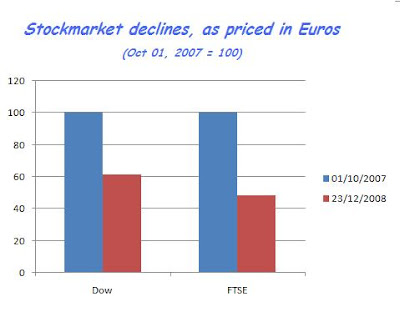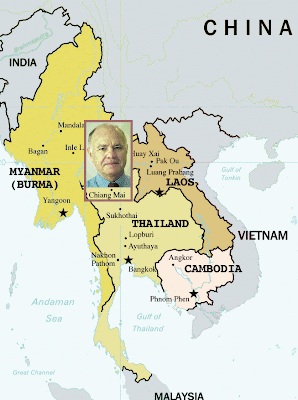
Wednesday, December 24, 2008
Relativism

Fasten your seatbelts
Tuesday, December 23, 2008
Democratic deficit
Vengeance is mine
UPDATE
And Jim Kunstler, too.
Every little thing's gonna be all right
Perhaps it's no coincidence that BBC is currently screening a remake of Terry Nation's gripping 1975 post-catastrophe series, "Survivors". But that series assumes that most people have died suddenly because of a virus, so the ecosystem has not been destroyed by desparate, starving victims. I don't think Survivors is the model we should use. If we are to survive, it'll be together, in our populous societies, because if society breaks down, you and I are unlikely to emerge as the last people standing. Lone heroes don't win; this is a fantasy.
I think spare supplies are a good idea, because there could be some disruption, which could affect the very young and elderly; so we need ways to keep warm, eat and have clean water in an emergency. And it's important to make your home secure against a rise in burglary, which is associated with economic downturns; and not to go out after dark without at least one or two companions. Weapons are another matter: "guns in the home are far more likely to be used against members of the household than against intruders."
Pace the doomsters, the UK and the USA will feed itself. We may end up eating more veg and less meat; and we may be using public transport instead of cars; personally, that would simply take me back to the 70s, when I was slimmer and fitter. Globally and locally, there is enough to feed the world, although not enough to overfeed it or encourage unproductive men to sire children.
Two aspects of the current crisis worry me:
1. The present method of organising resources may be replaced, not by one dreamed of by well-fed Western socialists, but by a cruel, remote, commanding elite as in North Korea or East Germany, who far from minimising scarcity will use it to get and maintain power.
2. The transition from this system to whatever replaces it, may be disorderly and involve suffering for many people.
This is why I think the underlying issue for us is to preserve and strengthen democracy, to increase the chances that both the journey and the journey's end are acceptable.
Monday, December 22, 2008
Why banks?
Satyajit Das (htp: Jesse)
Nope. Banks need destroying, as does all this bank-created debt. The mistake is to try to keep things as they are. How did we come to buy houses "on tick", then cars, and now our clothes and groceries? Why is there any lending for consumption, seeing how it only means reduced future consumption? Why should banks be kept going, requiring a significant proportion of our earnings, so that wages have to be high for us to live on what's left, making us uncompetitive with the developing world?
I am reminded of the pitiless response of the Comte d'Argenson to the satirist, Desfontaines:
Desfontaines: I must live.
D'Argenson : I do not see the necessity.
Sunday, December 21, 2008
The lesser of two weevils
In an apocalyptic - but carefully-reasoned - post, Karl Denninger says that when the deficit expansion stops, US government spending will have to be cut by 50 - 60%, unless there is to be a "general default" on debts.
I have no idea what a general default would look like, but in a closely-interwoven and distant-from-nature modern industrial society I can only fear it might prove utterly destructive. So we're back to contemplating the lesser, but still vast disaster.
I also have no idea how much worse it might be in the UK.
Someone else please read this unberobed OT prophet and tell me where he's wrong.
PS
While the Obama Administration cannot take a 'weak dollar' policy it is the only practical way to correct the imbalances brought about by the last 20 years of systemic manipulation. It is either that, or the selective default on sovereign debt, most likely through conflict, a hot or cold war.
Saturday, December 20, 2008
Christmas viewing
How will the future look?
 Thanks to the glacial catchup by the mainstream media, the public is finally worrying about economic depression, and consoling itself with the thought that we've messed it up for everyone, so at least the Chinese won't prosper and come over here as tourists, overdressed, overpaid and taking too many pictures for their digital photoframes at home.
Thanks to the glacial catchup by the mainstream media, the public is finally worrying about economic depression, and consoling itself with the thought that we've messed it up for everyone, so at least the Chinese won't prosper and come over here as tourists, overdressed, overpaid and taking too many pictures for their digital photoframes at home. 
Friday, December 19, 2008
Europe is keeping China (and America) going
Default
Wednesday, December 17, 2008
The seventh seal
With the $7 trillion dollars we have committed we could have literally given every homeowner with a mortgage a fifty percent reduction in the principal outstanding.
This would have instantaneously stopped all of the foreclosures by putting all (essentially) homes into positive equity - overnight!
So why wasn't this done?
 His answer: the government is trying to cover the staggering bets of the derivatives market. With borrowed money. The Treasury has swallowed the grenade and put its fingers in its ears.
His answer: the government is trying to cover the staggering bets of the derivatives market. With borrowed money. The Treasury has swallowed the grenade and put its fingers in its ears.This is the fourth horseman of the financial apocalypse that Michael Panzner predicted, as summarized here on Bearwatch on May 10, 2007.
UPDATE: Jesse comments on another fresh sum - tens of billions - needed to cover AIG's losses. As he says, there is an air of expectancy; but also of unreality, like the announcement of a major war.
Inappropriate gloat
Working my way into the system, it all seemed that it couldn't possibly work: too many people with no discernible talent were earning too much, and prices were lower than I thought they should be, particularly fuel prices. I thought the problem was that I wasn't intelligent enough, and just didn't understand.
The one personal satisfaction that I can get from the current mess is that I was right - it doesn't make sense.
WeaselWordWatch update: "Quantitative Easing"
On yer bike

Tuesday, December 16, 2008
Unstoppable
I cannot help but think of Douglas Adams' 'Shoe Event Horizon', where eventually every shop becomes a shoe shop.
The answer is blowing in the wind
In the news
Also in the Daily Mail, Alex Brummer says Madoff has queered the pitch for hedge funds generally. Damn: I had started to look at how to set one up, using links supplied by Jim from San Marcos. If I'd started a couple of years ago, I'd have got everyone into cash and made a packet for them and myself. 2 and 20, 2 and 20.
Odds on the bankers and hedgies Getting Away With It? Pretty fair, I'd have thought - especially when you bear in mind (as Denninger points out - and Jesse, too) all the others who could be implicated. To quote Oscar Wilde: "The good ended happily, and the bad unhappily. That is what fiction means."
Monday, December 15, 2008
On Competitiveness
Change the conditions so that some players have an advantage, and eventually those players will be the only winners. How long this takes depends on the size of the advantage.
This is the basis of the mutation and natural selection portion of evolution theory.
For a generation after World War II, the US had a huge advantage: capital, undamaged manufacturing capacity, cheap energy, and most of the scientists and engineers. Thus, we 'won' the economic game, and it was attributed to Americans being 'better'.
We failed to notice that many other nations were catching up in education and technology. That the government and industry chose to dis-invest in research in the 1980's just accelerated the process.
As the playing field is now level (or even tipped against us), we should carefully consider how to gain back that advantage. We have done so before in the short term: arming in World War II, the Manhattan Project, the Space Race.
Do we have the will to do this when not faced with war, but with long-term economic decline?
The elephant in the room?
In the 1960's, the US undertook an orgy of spending on the Great Society and the Cold War (including the Vietnam War and Space Race). At the same time, the typical middle-class American lived an extravagant lifestyle, relatively speaking. This was all fueled by cheap American oil, gas and coal.
By 1973, we had used so much that OPEC had us over a barrel, and by 1975 we had our first large trade deficits, which have grown every year.
Since about 1980, not much has come out of our industry that the rest of the world seems to want to buy.
Did we go broke 30 years ago, and are just now noticing it?
